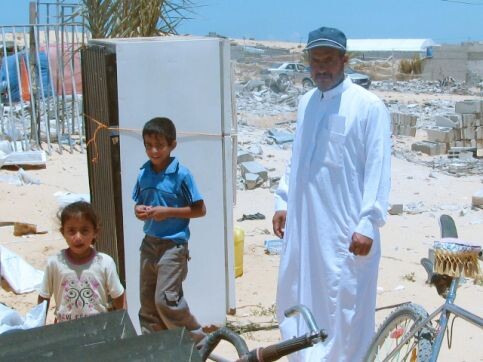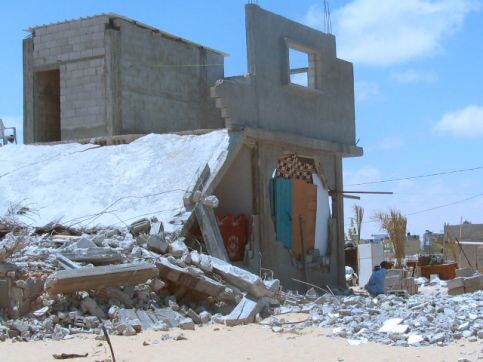The Electronic Intifada Rafah, Gaza Strip 27 May 2010

Nazmi Hammad’s family home was destroyed by Palestinian police in the Gaza Strip last week.
Near the entrance of the al-Barahma neighborhood west of Rafah in the southern Gaza Strip lie the ruins of the two-story house of Nazmi Hammad, 46, a father of 20 children and husband of three wives. Two of his wives now live in one of two tents that the family shares since their home was demolished on 16 May.
That morning, bulldozers arrived suddenly in al-Barahma, which was established approximately four years ago, and began demolishing 20 houses including Hammad’s. This tragic scene has been repeated all too many times in Palestine’s history, but what made this different, and a subject of great controversy and outcry, is that it was carried out by the Palestinian Land Authority (PLA), backed by police from the Hamas government which has administered the Israeli-occupied and blockaded Gaza Strip since the party won the 2006 election.
While residents say they obtained the land legally, the Hamas authorities say that the houses were built illegally on public land and that the demolitions took place only after the occupants had ignored numerous notices to evacuate them.
In al-Barahma, furniture was scattered everywhere on the plot that Hammad said he has owned legally, as his daughter Baraa drank from a water tank and one of his wives prepared food over a wood stove.
“What happened to me is unbelievable and unacceptable,” Hammad told The Electronic Intifada (EI) as he stood by the ruins. “How could they destroy my home, which I built here last year based on my legal ownership of the land? They did not even give us the chance to collect all our belongings.”
Asked by EI whether he had documents proving his ownership for the land, Hammad said, “Yes I do, and I can show you the contract for the purchase from last year.” Hammad, a former employee of the Palestinian Authority, said that he was forced to move to al-Barahma after selling his original home in al-Juneineh neighborhood east of Rafah in order to pay off debts. He said he bought the land in al-Barahma from a well-known local land owner. Hammad expressed his anger at the Hamas-controlled Gaza government and said, “I call upon Palestinian president [in Ramallah] Mahmoud Abbas to help us.”
Raja Khreis, 43, a nurse and father of seven, also told how he vainly tried to resist the demolition of his one-story home. “They came suddenly in the early hours of the morning and gave me one hour to evacuate the house,” Khreis said. “I tried to tell them this was not enough, but they didn’t listen.”
Khreis said that police beat him with a stick, injuring his shoulder which he bared to show the bruises. Sitting in a tent with owners of other demolished homes, Khreis said that since the demolitions he and his family have moved between relatives’ homes and his wife and children were now staying with his in-laws.
Khreis also said that he had obtained the land legally: “When I bought the land for building the home three years ago, I made sure of the fact that all the al-Barahma land was owned [legitimately]. One of the papers I was shown certified that the land is owned by the Barhoum family from Rafah City.”
For Khreis, the demolition of the house represents a catastrophic loss of all the savings he invested in it. “Before I moved here, I used to stay in Tal al-Sultan neighborhood,” he said. “But it seems we Palestinians are destined to move from place to place, carrying the title of refugees forever.” Clearly angered, Khreis added, “This time it is unbelievable, our own brothers displace us, scatter us and even beat us!”

The Hammad family’s demolished home.
Residents of the demolished houses have set up a committee in order to seek a remedy. According to committee head Fathi Abu Shawish, speaking in a tent that replaced the demolished local mosque, the disputed land was originally owned by Ahmad Barhoum, who inherited it from his father in 1946. Abu Shawish said that the municipality had given assurances that the residents’ land had been purchased legally.
“Two months ago, we settled the issue with the Conciliation Court in Rafah city,” Abu Shawish said. “By then the judge, Diya al-Astal, assured us that our lands are legally purchased and that the municipality would not demolish our homes. One month ago, the Rafah mayor himself promised us in front of the local factions’ representatives that the municipality would leave our homes intact. We wonder now, why did they demolish our homes?”
The independent Gaza-based Palestinian Centre for Human Rights (PCHR) expressed its “grave concern” over the demolitions, which it described as “a violation of civilians’ right to adequate housing.” PCHR called on the Gaza authorities to put a halt to any further demolitions which could affect an additional 180 houses in the area.
Abdul Aziz Afana, Director General of the Department of General Administration and Governmental Property at the Land Authority in Gaza told PCHR that the demolished houses had been built illegally on public land that had been allocated for the construction of a college. Afana said that numerous evacuation and demolition notices had been delivered to residents but these had been ignored.
According to Afana, the demolitions had been carried out strictly according to the relevant laws and procedures that had been in force since the early 1960s, when Gaza was under Egyptian administration (“20 Families Displaced as Palestinian Land Authority Demolishes Homes in Rafah,” 20 May 2010).
According to PCHR, the Rafah demolitions coincided with an announcement by Dr. Muhammad Awad, the Secretary General of the Cabinet in Gaza, of “a decision taken by the government in Gaza to expand areas allocated for housing on public land and to encourage individuals and institutions to build on public land.”
According to government statistics 69.9 percent of Gaza is privately owned, while 30.1 percent is public land. Infringements on public land are a common problem in densely-populated Gaza where there are severe shortages of housing and available agricultural land. The housing shortage has been worsened by a crippling shortage of building supplies due to the Israeli blockade.
Given the scale of the problem, PCHR called for a temporary freeze on all demolitions and the establishment of procedures such as signing contracts with those living on public land acknowledging the government’s ownership while expanding opportunities for people in Gaza to build legally on public property.
“These policies can be developed in a way that protects the legal ownership of these lands and that protects civilians against forcible eviction and displacement,” PCHR said in its statement.
Such measures would however come too late for the newly displaced families in Rafah. “This is a complete injustice” declared Nazmi Hammad, who with all his other problems is now worried about how his children can study for their final exams at school with no roof over their heads.
All photos by Rami Almeghari.
Rami Almeghari is a journalist and university lecturer based in the Gaza Strip.


